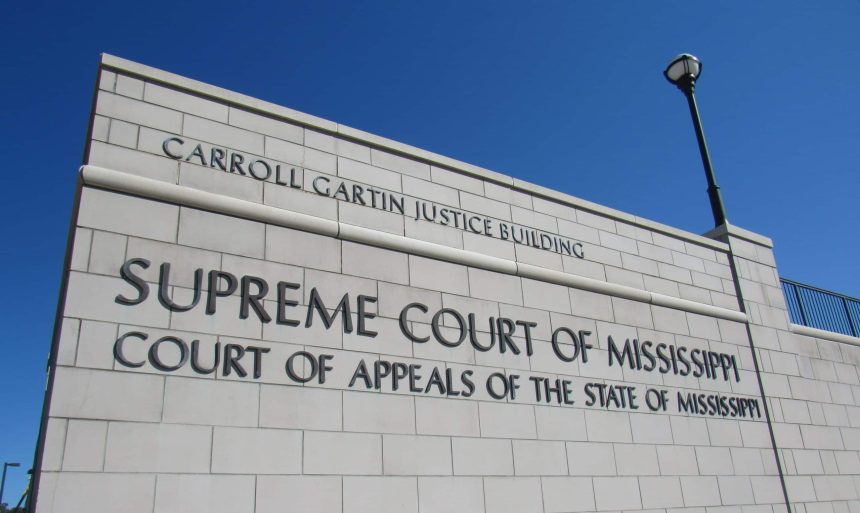Voters in Mississippi will take to the polls in less than a week. While the presidential election is at the forefront of most people’s minds, two state Supreme Court seats could end up carrying weight as challengers line up to shake up the court of last resort.
As four of the nine seats on the Mississippi Supreme Court will be on the Nov. 5 ballot, two are contested with one of those being largely contested. Justice Jim Kitchens, an incumbent seeking a third eight-year term, is being challenged by four people for the third position in District 1 which encompasses central Mississippi including the capital of Jackson. While Kitchens has referred to his challengers – Jenifer Branning, Byron Carter, Ceola James, and Abby Robinson – as “nice people,” the veteran judge believes his work on the state’s highest court is second to none.

“My platform is honesty, integrity, [and] dependability. I intend to continue doing just as I’ve been doing for almost 16 years on the Supreme Court,” said Kitchens, who has a record that includes 40 years of private practice and nine years as a district attorney for Copiah, Lincoln, Pike, and Walthall counties.
“I work hard. Nobody has ever said that I’m not doing a good job. Nobody has said that I’m not qualified,” he continued. “My experience, I know is one of my greatest assets.”
Kitchens noted that running a Supreme Court race in Mississippi has its own trials. Outside of being an elected judgeship, differing from appointed positions on the U.S. Supreme Court, those seeking office are restricted from saying how they would rule on hypothetical or impending cases as candidates would then be forming an opinion about a situation without knowing all the facts, also known as prejudging. Additionally, those seeking office are supposed to be nonpartisan based on a state law enacted in 1995.
But that hasn’t stopped one of Kitchens’ challengers from placing the race on or at least near the traditional left-right political scale.
Jenifer Branning, a three-term Republican state senator from Neshoba County, was recently endorsed by the Mississippi Republican Party as she has used interviews, stump speeches, and commercials to tout herself as a “constitutional conservative” seeking to replace a “liberal judge” on the Supreme Court. While the notion teeters with the idea that Branning is covertly running under a party label, she argues it’s simply an adjective describing how she would operate as a judge.
“People are getting on board with the concept of wanting a new generation of constitutional conservative leadership on the court. That’s basically what I’m about,” Branning said, asserting that she would still be impartial if elected. “Certainly, we tell people we feel like Mississippians need justices that are fair and impartial and will simply call balls and strikes on the bench. And that’s what I’m running to do.”
When asked to explain what a constitutional conservative would look like on the Mississippi Supreme Court, she answered: “Upholding the rule of law, upholding the constitution as it is written, and not carrying out the duties of the constitution as if it were a living and breathing document. It’s not. It says what it says, and I believe it’s incumbent upon the Mississippi Supreme Court to uphold what it says.”
Byron Carter, another challenger in the race who once clerked for the Mississippi Supreme Court and now practices as an attorney focusing on appeals, believes Branning’s framing of constitutional conservatism is nothing but a mechanism to get more votes in a red state amid a heated presidential election between Republican Donald Trump and Democrat Kamala Harris.
“Constitutional conservatism is a political buzzword. There are papers written trying to define what it means because it’s not so clear,” Carter said. “People hear that word, ‘conservative,’ and go vote for that person because they’re conservative. Go try to find that word and look up what it means. I’ve gone to two different law schools asking what it means, and nobody can give me a clear answer.”
Carter did add that elected officials and attorneys alike are sworn to follow the Constitution, but adding a political philosophy at the end makes for a misleading Supreme Court campaign, at least in his eyes.
The other two candidates in the lone District 1 race on this year’s ballot, Ceola James and Abby Robinson, declined or did not respond to requests for interviews. While Robinson has been mostly absent on the campaign trail, James did appear at the Neshoba County Fair this summer and urged central Mississippi residents to vote for her based on her experience as a nonpartisan judge on the Mississippi Court of Appeals.
“I promise you that if I’m elected, I will be fair as I’ve always been,” James said at the annual political portion of the event held in Branning’s home county. “My decisions have never been Democrat or Republican. My decisions have never been Black or white. My decisions have been fair.”
As of the Wednesday before the election, many political analysts predict the race will either have an outright winner or go to a runoff between Kitchens and Branning. If the latter becomes the case, a second election will be held on Tuesday, Nov. 26.
Moving south, the other contested Mississippi Supreme Court race is for the second position in District 2, which contains 27 counties and is powered by the Hattiesburg area and the Gulf Coast region.
Justice Dawn H. Beam, appointed by then-Gov. Phil Bryant in February 2016 before turning around and winning her first full term in November of that same year, is being challenged by David Sullivan. Beam is the only woman currently on the high court, and to her, maintaining some level of gender diversity is vital when around one in three cases involve Mississippi families.
“You have nine people on the court of last resort. We don’t have any room for error, and so nine people with diverse backgrounds come together. I don’t think anyone would disagree women and men think differently,” she explained, smiling. “I bring a unique view to the court and that’s important.”
Before taking her seat on the Mississippi Supreme Court, Beam was a judge in the state’s 10th Chancery District after serving as a prosecutor in Lamar County. She won her first race as a prosecutor by a single vote before separating herself in subsequent chancery court races and the 2016 election for Supreme Court, in which she doubled her opponent’s vote total.
Her challenger, Sullivan, is a Gulfport-based attorney who has held a municipal judgeship in D’Iberville since 2019. He has continued a line of judges from the family, with his father Michael Sullivan serving as a presiding justice on the Mississippi Supreme Court at the time of his death in 2000.
“Growing up, I had a front-row seat to how the court works and how the job is done. This is something I have always wanted to do, believe it or not,” Sullivan said. “I also have experience that my opponent does not have … I serve as a defense lawyer, a prosecutor, a civil defense lawyer, and a municipal court judge. To me, municipal court judge is ground zero of the legal system.”
Both Beam and Sullivan have set aside political allegiances during their respective campaigns, each promising to be impartial if elected.
Races for the Mississippi Supreme Court will take place on Tuesday, Nov. 5. The appellate court is the last stop for reviewing decisions made in the state’s lower courts, including the Court of Appeals, chancery courts, circuit courts, and country courts.







